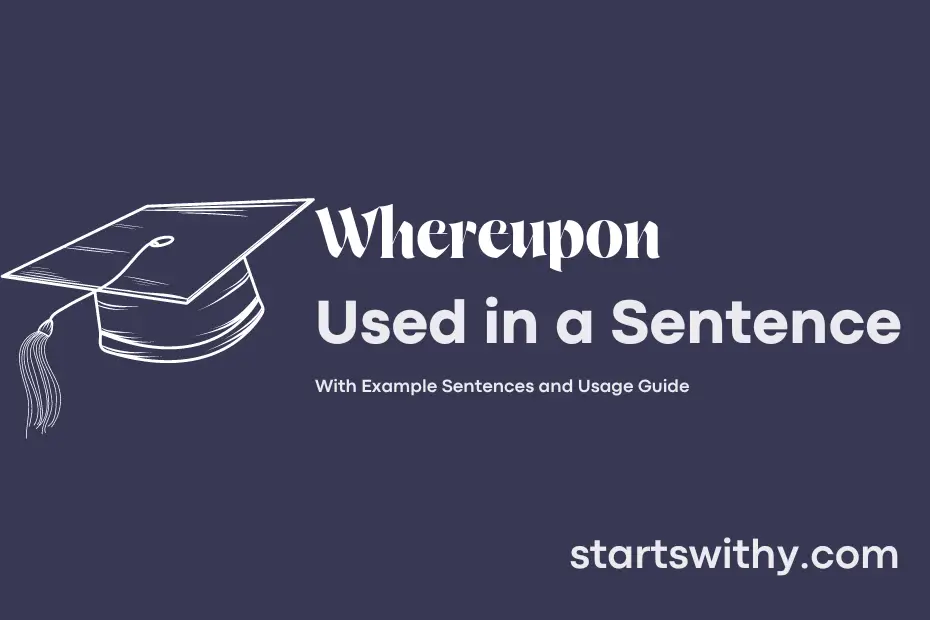Have you ever encountered a situation whereupon you were compelled to act immediately? The word “whereupon” is often used to describe a sequence of events or actions that occur as a result of a preceding event.
In English language, “whereupon” is a conjunction that signifies a cause-and-effect relationship between two consecutive actions or occurrences. It is frequently employed to indicate the moment or circumstances under which something else transpires.
7 Examples Of Whereupon Used In a Sentence For Kids
- A dog saw a cat running, whereupon it started chasing her.
- The sun went down, whereupon the moon appeared in the sky.
- The teacher rang the bell, whereupon all the students lined up.
- The baby cried, whereupon its mother picked it up to comfort it.
- The rain stopped, whereupon a rainbow appeared in the sky.
- The bird built a nest, whereupon it laid eggs in it.
- The farmer planted seeds, whereupon the plants started to grow.
14 Sentences with Whereupon Examples
- Whereupon receiving the exam timetable, the students started preparing diligently.
- The lecture hall was filled with chatter and excitement, whereupon the professor walked in and everyone settled down.
- The professor announced a surprise quiz, whereupon the students frantically opened their textbooks to revise.
- Whereupon entering the library, the students split up to find quiet corners to study.
- The canteen was buzzing with activity, whereupon a group of friends decided to grab a quick bite before the next class.
- Whereupon receiving their project grades, the students gathered to discuss their feedback.
- The college club held auditions for the annual drama production, whereupon the aspiring actors lined up nervously.
- The students were brainstorming ideas for their research project, whereupon one of them suggested a unique topic.
- Whereupon the college festival was announced, the students started planning their participation in various events.
- The sports team won the inter-college tournament, whereupon they celebrated with a victory parade around the campus.
- The final year students attended a career fair, whereupon they networked with potential employers.
- The deadline for submitting the internship applications was approaching, whereupon the students worked on polishing their resumes.
- The college announced a study abroad program, whereupon interested students signed up for information sessions.
- Whereupon the semester break began, the students made plans for a much-needed vacation.
How To Use Whereupon in Sentences?
To use the word Whereupon in a sentence effectively, it is important to understand its meaning and how it functions within the sentence structure. Here is a simple guide for beginners on how to incorporate Whereupon into a sentence:
-
Definition: Whereupon is an adverb that means “immediately after which” or “as a result of which.”
-
Placement: Whereupon is typically used at the beginning of a sentence to indicate the sequence of events or actions that follow.
-
Example: “She finally received the email, whereupon she immediately called her boss to discuss the new project.”
-
Usage: Whereupon is often used to convey a cause-and-effect relationship between two events, with the first event leading to the second one.
-
Punctuation: A comma is often used before Whereupon to separate it from the rest of the sentence. This helps to clearly show the connection between the two clauses.
-
Variations: While Whereupon is commonly used in written English, it may sound formal or old-fashioned in some contexts. You can use synonyms like “after which” or “at which point” for a more contemporary tone.
-
Practice: To become more familiar with using Whereupon in sentences, try incorporating it into your writing or speaking exercises. Pay attention to the flow of the sentence and how Whereupon contributes to the overall meaning.
Remember, practicing using Whereupon in sentences will help you become more comfortable with this word and enhance your language skills.
Conclusion
In conclusion, the phrase “whereupon” is used in sentences to indicate a point in time or a circumstance that leads to a subsequent action or event. It is commonly employed to show cause and effect, providing a clear link between two events. For instance, “She finished her meal, whereupon he brought out the dessert,” illustrates how the completion of one action triggers another.
By incorporating “whereupon” in writing or speech, the speaker can add a sense of flow and coherence to their narrative. It serves to seamlessly connect sequential events, guiding the recipient through a story or explanation. Understanding how to use “whereupon” effectively can enhance the structure and clarity of sentences, making them more engaging and easier to follow for the audience.



